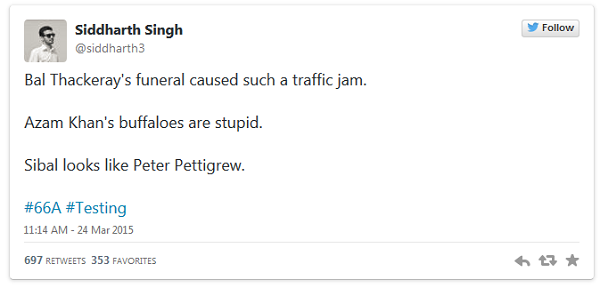India's Supreme Court Axes Online Censorship Law, But Challenges Remain
The Supreme Court of India took a remarkable step to protect free expression on March 24, 2015, striking down controversial section 66A of the IT Act that criminalized “grossly offensive” content online. In response to a public interest litigation filed by Indian law student Shreya Singhal, the court made this landmark judgement calling the section “vague”, “broad” and “unconstitutional”. Since Tuesday's announcement, the news has trended nationally on Twitter, with more than 50,000 tweets bearing the hashtags #Sec66A and #66A.
The blog entry by Subhashish Panigrahi was originally published by Global Voices Online on March 25, 2015. Pranesh Prakash is quoted.
Section 66A allowed police to arrest any person who sent online communications deemed “grossly offensive” or known to be false. This has enabled the government take down many websites with allegedly objectionable content. Among various cases since the law was updated in 2008, two people were arrested for making comments on Facebook regarding India's prime minister Narendra Modi and one man was arrested for commenting on public service closures following the death of political leader Bal Thakrey.
The now-defunct Section 66A reads as follows:
66-A. Punishment for sending offensive messages through communication service, etc.
—Any person who sends, by means of a computer
resource or a communication device,—
(a) any information that is grossly offensive or has menacing character; or
(b) any information which he knows to be false, but for the purpose of causing annoyance, inconvenience, danger, obstruction, insult, injury, criminal
intimidation, enmity, hatred or ill will, persistently by making use of such computer resource or a communication device; or
(c) any electronic mail or electronic mail message for the purpose of causing annoyance or inconvenience or to deceive or to mislead the addressee or
recipient about the origin of such messages, shall be punishable with imprisonment for a term which may extend to three years and with fine.
Internet rights advocate and lawyer Pranesh Prakash, who works with the Center for Internet and Society in Bangalore, has been one of the law's most outspoken critics in recent years. Immediately following the ruling, he tweeted:

Nikhil Pahwa, independent journalist and founder of the MeddiaNama blog, offered his take on the ruling:
This is a great decision for freedom of speech in India…66A is far too vague, and lends itself to arbitrary implementation by the police, especially phrases like “grossly offensive”, annoyance, inconvenience, ill will. Remember that even the right to offend is an integral part of free speech.
Journalist and author Sagarika Ghose sarcastically wondered if the government of India would retroactively offer recompense for all of the actions taken against citizens for violating 66A.

Some were playful in their response to the decision. Siddharth Sing set out to “test” the efficacy of the ruling with a tweet mocking prominent public figures in Indian politics:

Section 69, which provides authorities with the power to censor websites that “create communal disturbance, social disorder, or affect India's relationship with other countries” was upheld however. The Court has yet to clarify this decision. CIS India's Pranesh Prakash tweeted:
Unfortunately 69A (website blocking) has been upheld despite many issues, incl lack of transparency. Need to read full judgment to see why.
— Pranesh Prakash (@pranesh_prakash) March 24, 2015
Tuesday's decision comes after the government of India was heavily criticized in January 2015 for blocking 32 websites in the country.

